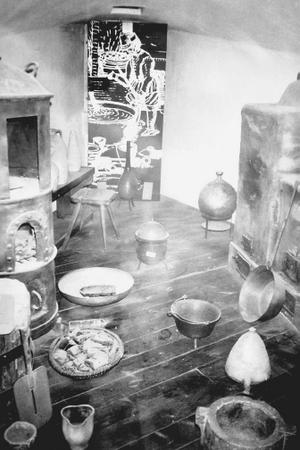Alchemy
The alchemical period corresponds to the span of human history that preceded the era in which fundamental understanding in the chemical sciences began to be acquired by humankind. Most scholars believe that alchemy had its roots in ancient Egypt. China has also emerged as a possible source of alchemical thought. Thus, alchemy was the practice of chemistry such as it existed over the approximately twenty-five centuries before the time of Robert Boyle (1627–1697) and Antoine Lavoisier (1743–1784), when chemistry began to develop into the science we know today. Alchemy was an early precursor to science and included many of the chemistry-related processes that have become known as the chemical arts—the working of metals and alloys , glassmaking and glass coloring, and the preparation and use of pigments, dyes, and therapeutic agents.
In its broadest aspect, alchemy appears as a system of philosophy that strove to penetrate the mystery of life as well as to master the formation of inanimate substances. The main goals of the alchemists were the transmutation of base metals into gold and the attainment of the "Philosopher's Stone," a substance that would bring perfection to life. Other embodiments of the Philosopher's Stone were the Elixir Vitae, the Grand Magisterium, and the Red Tincture, all regarded as universal medicines. The alchemical fascination with gold emerged from the idea that gold was the perfect metal. If one could understand the essence of this perfect metal (the theory went), the essence of all substances less perfect than gold could then be understood, which, accordingly, could lead to the creation of all substances, including gold. The Philosopher's Stone incorporated the promise that the perfection of gold could somehow be transferred to life's processes. The Philosopher's Stone was the agent by which base metals could be changed to gold and, by extrapolation, could lead to greater longevity. The Chinese alchemists included these ideas in their approach to alchemistry. They sought the preparation of a liquid form of gold that would promote longevity; liquid gold would contain the essence of the Philosopher's Stone and the search for liquid gold was one route to the Philosopher's Stone. The Chinese alchemists were interested in the preparation of artificial cinnabar, which they believed to be the "life-giving" red pigment that could be used in goldmaking. They were also interested in the transmutation of base metals into gold. Thus, the focus of alchemical thought and process was the manipulation of matter in such a way as to, ultimately, increase longevity.
It is not surprising that in the early days of alchemy, much of the ancient Egyptian expertise in gold refining and goldworking as well as the Egyptian skill with respect to enamelware, the production of colored glass, and the preparation and use of pigments were highly valued by alchemists. In a sense, those Egyptian craftsmen were the first alchemists, even though

they may not have had the same ultimate focus as the practitioners of the alchemical arts.
In the course of the evolution of the alchemical arts, the fundamental properties of matter came under consideration. Aristotle taught that all matter consisted of four fundamental constituent factors or elements—air, water, earth, and fire. All matter was supposed to incorporate these four elements in different combinations and proportions. The changes that a substance could be made to undergo, for example, the burning of wood or the boiling of water, corresponded to a change or changes in the proportions of these four elements within that substance. Thus, alchemy ultimately gave rise to modern chemical thought and, gradually, the goals of alchemy were abandoned. In a broad sense, alchemy can be regarded as a prelude to the chemistry we know today.
SEE ALSO Al-Razi, Abu-Bakr Muhammed ibn Zakariya ; Boyle, Robert ; Lavoisier, Antoine ; Paracelsus .
J. J. Lagowski
Bibliography
Brock, W. H. (1993). The Norton History of Chemistry. New York: W. W. Norton.
Lindsay, Jack (1970). The Origins of Alchemy in Graeco-Roman Egypt. New York: Barnes and Noble.
Comment about this article, ask questions, or add new information about this topic: